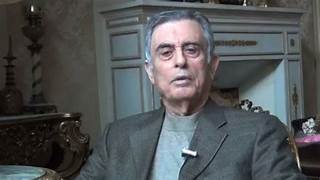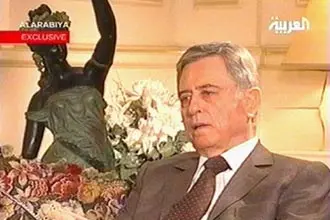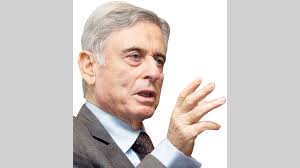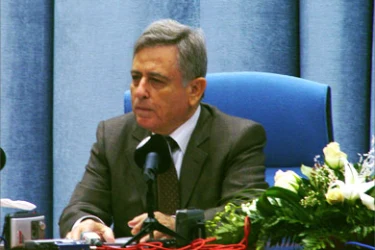Abdel Halim Khaddam, the former deputy president of Syria and leader of the opposition National Salvation Front, has announced his support for international military strikes against his country, similar to the situation in Libya. In an interview with Asharq Al-Awsat held in Brussels, he accused the international community of employing double standards in their approach to the Arab revolutions. Khaddam further highlighted that there is currently an international movement, facilitated through the United Nations Human Rights Council, to pass a resolution referring the Syria file to the International Criminal Court in The Hague, as was done with Libya. This would enable the trial of President Bashar Al-Assad and others before international justice.
However, Khaddam raised several questions. He queried whether there is an international agreement to protect Assad, who aided the Iranians in Lebanon and Iraq. He questioned whether the international community wishes to avoid a confrontation with Iran by not prosecuting Assad. Are there any connections in this regard? Additionally, he asked if there is a single reason for the international community to shield Assad and why the Syrian people are bearing the brunt of the consequences. Khaddam expressed his concern over the unanswered questions and the various contradictory statements he encounters.
- Before the start of the dialogue, you mentioned the existence of an international deal to protect President Assad. However, it was reported that US President Barack Obama is moving towards declaring that President Assad has “lost his legitimacy.” Doesn’t this contradict the international deal you mentioned?
- If President Obama takes this step, it is a positive development, and it would indicate that there is no deal. However, the current position of the international community sometimes raises perplexing questions. For instance, is there an international deal to protect Assad, who aided the Iranians in Lebanon and Iraq? Does the international community refrain from prosecuting him to avoid a confrontation with Iran? Are there any connections in this regard? Is there a single reason for the international community to shield Assad? Why are the Syrian people paying the price without any action being taken? We hear different statements and questions like these without sufficient answers. Nevertheless, there are international and American initiatives underway.
- But there are international and American moves
- The American administration has recognized the gravity of the situation in Syria, particularly after the press interview with Rami Makhlouf, a Syrian businessman and relative of President Assad, in the “New York Times” newspaper. In that interview, he revealed the strategy of the Syrian regime, which previously claimed to be an opposition regime, supportive of resistance, and a regime of steadfastness. Makhlouf’s message to the Americans was that the stability of Israel is linked to the stability of Syria. This exposes the regime’s lies and deceit aimed at manipulating Arab public opinion on one hand, while urging Israelis to support him on the other. However, why should Israelis be concerned about a Syrian regime that sent its planes to Deir ez-Zor, traversing the skies of Syria without daring to launch a missile? Similarly, the regime sent its planes to Ain Sahib, a mere 10 kilometers away from Damascus, yet it did not dare to fire a missile.
- Maybe this is what Makhlouf is trying to convey, “You should be worried if we leave.” But do you believe that the Assad family is responsible for everything that has befallen the Syrian people?
- What happened to the Syrian people is a result of the nature of the dictatorial regime. This system holds authority, starting from Hafez al-Assad and then passed on to his son. This implies that the family holds power, and thus, the family bears responsibility. Every member of the Assad family has utilized their influence to pursue personal goals and suppress and mistreat the people.
- Some argue that this is the work of the old guard…
Where is this so-called old guard?
- There are individuals like Farooq Al Shara…
Farooq al-Shara has no say or power. What has Farooq al-Shara accomplished? He cannot even make a minor decision.
- By the way, there has been talk recently about the absence of Sharia, despite his pictures appearing on certain occasions.
The pictures circulated of Farouq al-Shara and Bashar al-Assad on Martyrs’ Day are misleading. Sharia did not attend the Martyrs’ Day celebrations, nor did Bashar. The pictures shown by Syrian television are from last year’s Martyrs’ Day. They are archival images, and all the individuals who appeared on Syrian television were from last year, not this year.
- Has Assad eliminated the old guard?
There is no old guard. There never was an old guard. Does anyone really think Farouq al-Shara holds any authority? The people of his own town and city (Daraa) were killed, persecuted, and displaced. What has he done for them? If he truly had influence, he would have done something, but he remains confined to his home. The notion of an old guard and their supposed influence is a farce.
- The distinction between the two cases – Libya and Syria…
- The situation is identical. Bashar al-Assad even aids Muammar Gaddafi by sending pilots and technicians to attack the rebels. What is occurring in Libya is also occurring in Syria. The regime is employing the army to suppress protesters. In Egypt, the situation differs because President Mubarak did not resort to using force. While some regrettable incidents did take place, it cannot be claimed that Mubarak employed excessive force or directed the army to attack protesters. The Egyptian army is a national army. In Syria, however, the army does not represent the people; it serves as the army of the ruling sect. The vast majority of army officers belong to the same group, predominantly Alawites from regions such as Horan, Damascus, its countryside, Homs, Hama, Deir ez-Zor, Qamishli, and Banias. There isn’t a single officer from outside that sect.
- Why hasn’t there been a military intervention in Syria, as in Libya?
- The current international response is inadequate and ineffectual. The United States has imposed sanctions on five individuals, which holds no real value since these officials have no assets there and do not travel internationally. Hence, sanctions hold no significance.
If the international community does not intervene and take decisive action to aid the Syrian people and safeguard their well-being, the Syrian people will have no choice but to wage a struggle for national liberation because the current regime is not a national system. The Syrian people must fight to regain control. If the international community remains silent in the face of the atrocities unfolding in Syria, it will have severe repercussions and consequences not only for Syria but also for the entire region.
Are you advocating for military strikes against Syria, akin to what is happening in Libya?
- Yes, that is what we desire. We do not want the international community to apply double standards when it comes to the Arab revolutions.
- Who is the most suitable to lead Syria after the change?
- The Syrian people, comprising 23 million individuals, are capable of identifying and selecting competent leaders. If you randomly pick any 10 individuals from the street, you will find them more capable and deserving than the current system.
- Will leadership come from abroad or from within?
- We prefer it to emerge from within. Syrians living abroad do not have the right to assume leadership over the Syrian people. The young people leading the protests in cities and rural areas, enduring torture and murder, should be the ones to lead the country. Syrians abroad should support and assist them, not replace them.
I have made this declaration before, and I reiterate it: I personally have no aspirations for power. I will not return to authority. I believe the role of previous generations is over, and it is now the responsibility of these new generations.
- Is the Syrian opposition divided?
- The revolution in Syria does not solely belong to the Syrian opposition. It is the youth of Syria who initiated and propelled the revolution forward. The people have rallied around this revolution, and all opposition parties in Syria are working alongside it. Therefore, it is not a creation of a specific party or group; it is a youth-driven revolution, not a party-based one.
- In the Egyptian context, we didn’t witness a single leader or symbol of the revolution.
- The situation in Egypt was different. The absence of one leader or a symbolic figure allowed the people to flourish. Free and fair elections should be held, enabling the Egyptian people to elect their representatives and choose their government. Egypt must return to democracy, and the same applies to Syria. Unfortunately, all the revolutionary regimes established in the Arab world, under the guise of reform and change, have placed their people in distressing situations, and they must adhere to the will of their people.
-
- Are you currently in Brussels? Have you met with any personalities from the European Union?
- I haven’t personally met anyone, but I have held meetings in Brussels on occasion with deputies, engaging in dialogue.
- Are you conveying a message to the European Union?
- A message has been sent to the European Union, several European presidents, and the heads of the permanent members of the Security Council.
- What is the content of the most recent message?
- The message pertained to the situation in Syria and emphasized the urgent need for the international community to intervene and take measures to save the Syrian people.
- Is the international response progressing swiftly or slowly?
- As I mentioned, the progress is slow, but there are ongoing efforts within the United Nations Human Rights Council to pass a resolution referring the Syrian file to the International Criminal Court in The Hague, similar to what transpired in Libya. This would facilitate the trial of President Bashar Al-Assad and others before international justice.
- Do you possess lists of individuals directly responsible for crimes in Syria?
- Yes, we have compiled a list of 60 officials who were directly involved in the killings.
- Do you have evidence to support these claims?
- There is concrete evidence and ample factual documentation available, including videos and insider information. We have called for the establishment of an international commission of inquiry to visit Syria and gather firsthand accounts, but the Syrian authorities have refused such access, knowing that it would expose the realities on the ground.




